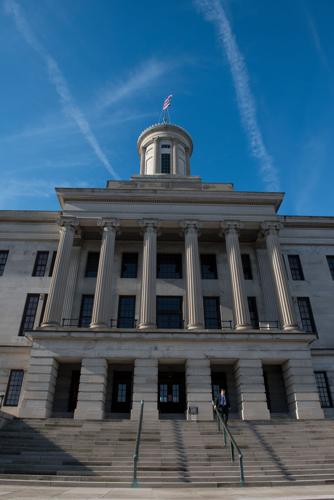
The Tennessee State Capitol in downtown Nashville
The stench of investigations and subpoenas and resignations and expulsions hung heavy as the Tennessee General Assembly returned to work in January.
It’s a familiar odor at the Tennessee State Capitol in Nashville, having soaked into the carpets through the decades, and this year was no different. A federal investigation into a trio of House lawmakers was well underway, with one indictment and resignation looming and others still on the menu. One senator had been convicted on federal charges and was soon to be expelled from the body; another had been indicted but was awaiting trial.
Triggering a federal criminal investigation is one of the only bipartisan acts at the Tennessee legislature.
In between responding to subpoenas, Tennessee lawmakers found time to make laws during the 112th Tennessee General Assembly, which adjourned roughly a month ago. Top of mind were two priorities — one sanctioned by Republican Gov. Bill Lee and the other in direct conflict with his stated goals.
First, Lee and his Republican allies, who control both chambers of the legislature, endeavored to completely rewrite the formula that the state uses to fund K-12 education. With few hiccups, they were successful (read more here), though it remains to be seen what some of the long-term effects of the fundamental change to one of the state’s most significant annual expenditures will be. Some Democrats and public education advocates offered token opposition to the proposal, but it mostly faced smooth seas and even attracted support from reliably progressive groups.
The second big push caused more heartburn among the conservatives who dominate state government. Leaders in the legislature endorsed so-called “truth in sentencing” legislation, aimed at making sure that certain prison sentences cannot be cut short. According to criminal justice reform advocates — including those on the right — it flies in the face of Lee’s stated priorities dating back to his 2018 campaign for governor. He let the bill become law without his signature, which, considering that he has yet to veto any legislation, is the strongest kind of rebuke he has for his fellow Republicans.
“We were trying to make it a better bill, but it became quite apparent early on that they were not willing to negotiate any of the things that were of major concern, like how much money it could potentially cost,” says Tori Venable, Tennessee director for the conservative advocacy group Americans for Prosperity.
Venable adds that the conservative lawmakers supporting the stricter sentencing rules — conservatives with whom she is often allied — were after “cheap political points.”
“It looks like it’s going to cost us a whole lot of money, and the data doesn’t reflect that it’s going to improve public safety,” she says.
A highlight for Venable was the school funding changes, but a lowlight came toward the end of session when lawmakers rushed through $500 million in bonds for a proposed new Tennessee Titans stadium in Nashville. She’s slowly trying to grow an “anti-corporate-welfare caucus,” but this year, no dice.
Lee all but certainly will be back for another four years in 2023. Asked what his first priority of a second term should be, Venable does not hesitate: “End civil asset forfeiture.”

Sen. Jeff Yarbro (D-Nashville) listens to speakers at a pro-choice demonstration in Nashville on May 3, 2022
She’s also asking for more transparency in the legislative process. More often than not, the process by which a proposal becomes (or doesn’t become) law is inscrutable to anyone but those able to hire a lobbyist. Committee votes are rescheduled at the last minute, amendments are not posted online, and simple language describing what a bill would actually do is unavailable.
“Just an average concerned citizen?” she says. “There’s no way. Every other state can do this. … It’s good government.”
In addition to passing major policy changes like truth in sentencing and a school funding overhaul, plus a grocery tax break and a redistricting plan that left Nashville split into three congressional districts, Tennessee lawmakers returned to an old favorite pastime: using the state’s levers of power as a glorified social media posting machine.
Some of the efforts are meaningless, like a resolution applauding Elon Musk for his (potentially doomed) purchase of Twitter. Others have the possibility to make real changes, including to the list of books kids are allowed to read or which bathrooms they are allowed to use.
“The big issue is whether the Republicans in the legislature can focus on actual issues that matter, or whether they’re going to continue to be distracted by whatever’s on Fox News this week,” says Senate Minority Leader Jeff Yarbro (D-Nashville). “When we started last year’s session, nobody had even heard of critical race theory, but we finished the session by passing a law on it. When we started this most recent session, nobody was talking about the dangers of librarians, but we passed four bills dealing with libraries. Republicans have become like 5-year-olds playing soccer, where they just run wherever the ball is kicked by Fox News and right-wing media. To me, that’s the biggest problem we have in the state, that we can’t keep people focused on issues that matter or even principles that last longer than the next couple of news cycles.”
Last month marked the conclusion of the 112th Tennessee General Assembly. State lawmakers made a lot of noise. Here’s what they did — and didn’t — get done.







